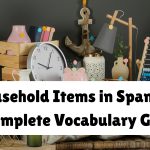Looking at Spanish words starting with ‘N’ opens up a world of language and culture. Words like ‘noche’ (night) and ‘necesidad’ (necessity) show how Spanish uses simple words for both everyday things and big ideas. They help us see how people talk and think differently in various Spanish-speaking places.
Think about where these words come from and how they’ve changed over time. It’s interesting to see how the Spanish language evolves and reflects its diverse speakers.
History Of Letter N In Spanish Language
The letter N started with the Phoenicians and has traveled through many languages and times to become a key part of the Spanish alphabet.
It sounds a lot like the N in English, so it’s easy for English speakers to pronounce. This letter shows up in many languages, making it important for building words and adding to the variety of the Spanish language.
100 Spanish Words with Ñ
The Ñ in the Spanish alphabet adds special features to the language. When you look at words starting with Ñ—like nouns, adjectives, adverbs, and verbs—you see how much this letter shapes Spanish.
It’s not just about grammar; it’s about culture too. This deep dive helps us get the subtle details and the bigger picture.
Nouns that start with N in Spanish
When we look at Spanish nouns starting with the letter N, like ‘naranja’ (orange) and ‘niño’ (child), we see how diverse and culturally rich the language is. These words do more than just build our vocabulary; they give us a glimpse into daily life, relationships, and nature in Spanish-speaking places.
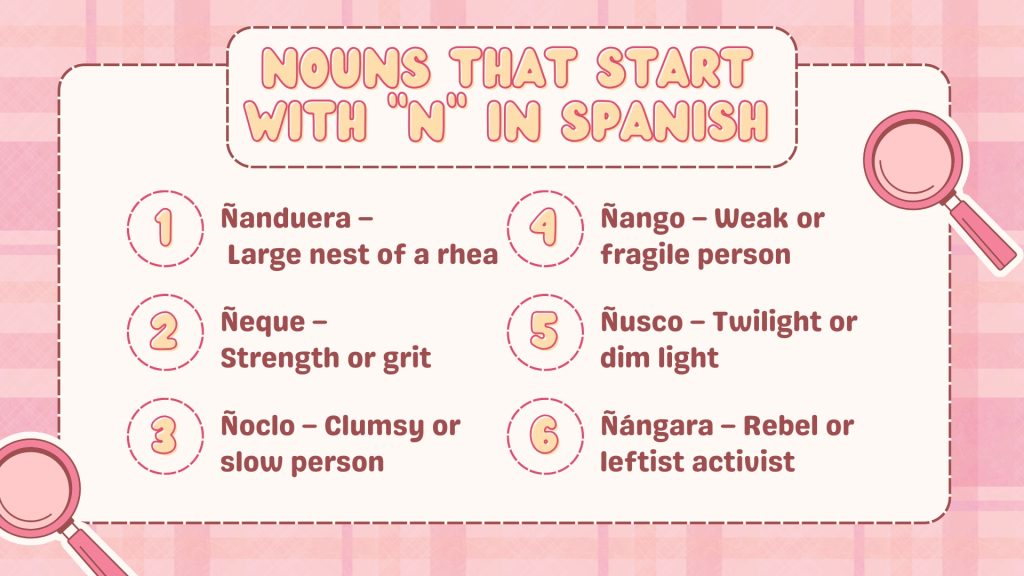
It’s fascinating, isn’t it? How language ties so closely with culture.
| Word | Meaning |
|---|---|
| Nácar | Mother-of-pearl, a smooth, shiny material found in shells. |
| Níspero | A small, sweet-and-tangy fruit. |
| Niebla | Thick fog or mist. |
| Nudillo | Knuckle, the bony part of your fingers. |
| Náufrago | Castaway, a person stranded at sea. |
| Nogal | Walnut tree, known for its strong wood. |
| Novato | A beginner or rookie at something. |
| Némesis | A rival or opponent that challenges you. |
| Nicho | A small space or recess, often used for statues or graves. |
| Nostalgia | A deep longing for the past. |
| Narval | Narwhal, a whale with a spiral tusk. |
| Nación | A nation or country. |
| Navío | An old-fashioned ship or vessel. |
| Nativo | A native person or thing. |
| Núcleo | The core or nucleus of something. |
| Nómada | A nomad, someone who moves constantly. |
| Nitrógeno | Nitrogen, a vital element in the air. |
| Neurona | Neuron, a brain cell responsible for thought. |
| Nebulosa | Nebula, a cloud of cosmic dust in space. |
| Narciso | Narcissus, a flower or a self-obsessed person |
Adjectives that start with N in Spanish
Spanish adjectives that start with ‘N’ or ‘Ñ’ really spice up the language. You’ve got words like ‘nuevo’ which means new, ‘nacional’ which means national, and ‘ñuño’ which means weak or feeble. Each one adds its own flavor.
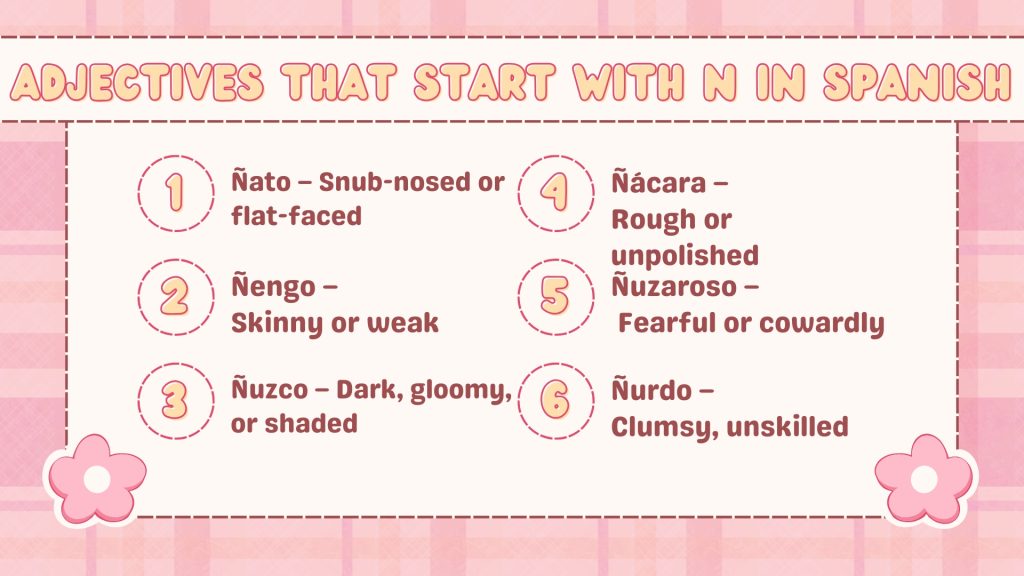
When you use these adjectives, you can get really specific about what you’re describing. It makes both talking and writing in Spanish a lot richer.
| Word | Meaning |
|---|---|
| Nítido | Clear, sharp, or well-defined. |
| Nefasto | Disastrous or unlucky. |
| Noble | Noble or honorable in character. |
| Negligente | Careless or neglectful. |
| Nauseabundo | Nauseating or sickening. |
| Narcisista | Self-absorbed or vain. |
| Notorio | Famous, well-known (often for something bad). |
| Navideño | Christmas-related. |
| Necio | Foolish or stubborn. |
| Novedoso | New and innovative. |
| Neutro | Neutral, not taking sides. |
| Nómada | Nomadic, constantly moving. |
| Nacional | National, related to a country. |
| Nítido | Bright or distinct. |
| Natural | Natural or organic. |
| Nocturno | Night-related, active at night. |
| Notable | Remarkable or outstanding. |
| Nervioso | Nervous or anxious. |
| Necrológico | Related to death or obituaries. |
| Nutritivo | Nutritious, full of good nutrients. |
Learn new Spanish words beginning with M —explore now!
Adverbs that start with N in Spanish
Spanish adverbs that start with ‘N’ are crucial for shaping how verbs, adjectives, or other adverbs work. They help make meanings clear and add flavor to sentences. This lets people express subtle differences and stress points when they talk or write.
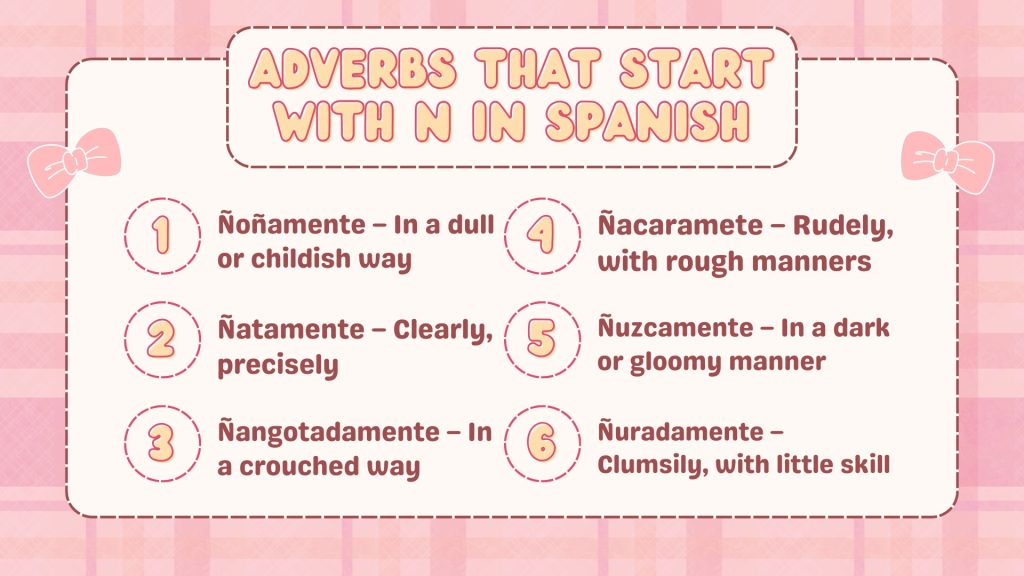
These adverbs, such as ‘normalmente’ (normally) and ‘nunca’ (never), play a significant role in Spanish language, enhancing communication and providing nuances to expressions.
| Word | Meaning |
|---|---|
| Notablemente | Notably, in an outstanding way. |
| Nuevamente | Again, once more. |
| Necesariamente | Necessarily, without choice. |
| Naturalmente | Naturally, in a normal way. |
| Negativamente | Negatively, in a bad or opposing way. |
| Nocturnamente | In a night-related manner. |
| Nítidamente | Clearly or sharply. |
| Normalmente | Normally, as usual. |
| Nerviosamente | Nervously, with anxiety. |
| Nada | Nothing, at all. |
| Neuróticamente | Neurotically, with anxiety. |
| Nacionalmente | Nationally, across a country. |
| Neceseramente | Essentially or necessarily. |
| Nefastamente | Disastrously, bringing bad luck. |
| Nominalmente | In name only, formally. |
| Notoriamente | Noticeably or obviously. |
| Nutritivamente | In a nutritious way. |
| Neutralmente | Neutrally, without bias. |
| Narrativamente | In a storytelling way. |
| Nostálgicamente | Nostalgically, with longing for the past. |
Verbs that start with N in Spanish
After talking about adverbs that start with ‘N’, let’s dive into verbs beginning with ‘N’ in Spanish. These verbs, such as ‘nadar’ (to swim), ‘necesitar’ (to need), and ‘negociar’ (to negotiate), are key for making sentences that not only make sense but also prompt action.
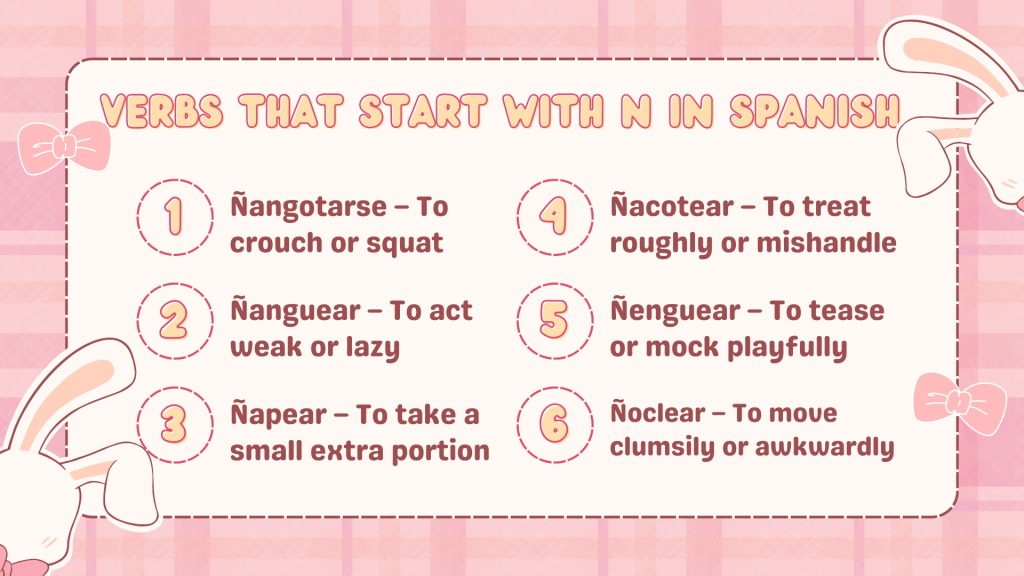
These action words play a crucial role in constructing sentences that convey meaning and facilitate communication effectively.
| Word | Meaning |
|---|---|
| Nadar | To swim. |
| Narrar | To narrate or tell a story. |
| Negar | To deny or refuse. |
| Nombrar | To name or appoint. |
| Navegar | To navigate or sail. |
| Necesitar | To need. |
| Neutralizar | To neutralize or balance out. |
| Notar | To notice or perceive. |
| Nutrir | To nourish or feed. |
| Nacer | To be born. |
| Nublar | To cloud over or make unclear. |
| Nostalgizar | To feel nostalgia. |
| Nausear | To feel nauseous. |
| Normalizar | To normalize or make usual. |
| Niveles | To level or even out. |
| Nacionalizar | To nationalize, bring under government control. |
| Nocionar | To have an idea or notion. |
| Notificar | To notify or inform. |
| Nutrirse | To nourish oneself. |
| Negociar | To negotiate or make a deal. |
The Nitty-Gritty of “N
In places like Nicaragua and Costa Rica, the letter N shows up in special ways that really shape how people talk there. Knowing these unique forms helps anyone trying to really get the local way of speaking or just appreciate the Spanish language as it’s used in these countries.
It’s pretty crucial if you want to understand or speak like a local.
- Spanish speakers see “Ñ” as a key identity marker. It’s in words that capture culture, humor, and history.
- It doesn’t exist in Latin or original Romance languages. It developed in medieval Spain as shorthand for double “N” sounds.
- It’s a letter, not an “N” with an accent. The tilde (~) changes pronunciation, making it a separate letter
Improve your Spanish with words starting with Y.
N” in Different Regions
In different Spanish-speaking areas, how people say the letter ‘N’ changes, especially when it comes before various vowels.
For example, in Argentina, the ‘N’ sounds a bit softer than the sharp way it’s pronounced in Central America.
These small differences in pronunciation add a rich variety to the Spanish language, showing the unique flavor of each region.
- Spain: Used in formal writing and classic literature. Words like “año” (year) and “señor” (mister) are common.
- Caribbean: Many playful, informal words like “ñángara” (rebel) and “ñango” (weak).
- Argentina & Uruguay: Often used in slang, like “ñato” (snub-nosed).
- Andes Region: Some unique verbs and adjectives, like “ñurdir” (mess up).
- Mexico & Central America: Used in rural expressions, such as “ñuzco” (gloomy).
| Word | Spain | Mexico | Argentina |
|---|---|---|---|
| Nieve | Snow | Ice cream (sometimes) | Snow |
| Naco | Rude or uneducated (rare) | Slang for tacky or low-class | Not commonly used |
| Ñoño | Dull, boring | Childish, whiny | Overly sensitive |
| Neta | Not commonly used | Truth or real deal | Not commonly used |
| Nafta | Gasoline (archaic) | Gasoline (rare) | Gasoline (common) |
Conclusion
To put it simply, the letter ‘N’ in Spanish is more than just a letter. It’s really important both for the language and for cultural reasons. It shows up in everyday words and shows different local flavors.
If you take a closer look at its history, learn about the ‘ñ’ character, and see how different areas use it, you’ll get a much clearer picture of how Spanish changes and grows but still keeps its unique local identities.
This kind of exploration really shows how rich and adaptable Spanish is.
Keep exploring great reads with Lingua Viva.
Born in Cali, but raised in London, Juan Pablo has led an interesting life. He has an undergraduate degree in Foreign Language and 10+ years of experience. Juan Pablo has taught and worked as a professor and interpreter in Spanish, English, and French languages. He prides himself on having a ‘situational teaching style’, which means he caters lessons to fit student needs. He is serious about teaching, responsible, professional, clear, and concise.







